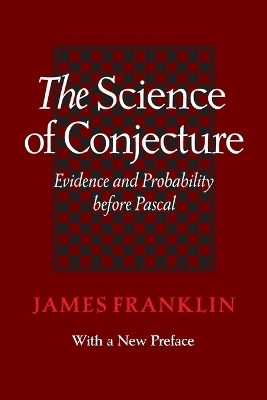
The Science of Conjecture
Johns Hopkins University Press (Verlag)
978-1-4214-1880-3 (ISBN)
James Franklin is a professor in the School of Mathematics and Statistics at the University of New South Wales.
Contents: Preface Chapter 1: The Ancient Law of Proof Egypt and Mesopotamia; The Talmud; Roman Law; Proof and Presumptions; Indian LawChapter 2: The Medieval Law of Evidence: Suspicion, Half-proof, and the Inquisition Dark Age Ordeals; The Gregorian Revolution; The Glossators Invent Half-Proof; Presumptions in Canon Law; Grades of Evidence and Torture; The Postglossators Bartolus and Baldus; The Competed Theory; The Inquisition; Law in the EastChapter 3: Renaissance Law Henry VIII Presumed Wed; Tudor Treason Trials; Continental Laws: The Treatises on Presumptions; The Witch Inquisitors; English Legal Theory and the Reasonable ManChapter 4: The Doubting Conscience and Moral Certainty Penance and Doubts; The Doctrine of Probabilism; Suarez: Negative and Positive Doubt; Grotius, Silhon, and the Morality of the State; Hobbes and the Risk of Attack; The Scandal of Laxism; English Casuists Pursue the Middle Way; Juan Caramuel Lobkowitz, Prince of Laxists; Pascal's Provincial LettersChapter 5: Rhetoric, Logic, Theory The Greek Vocabulary of Probability; The Sophists and the Art of Persuasion; Aristotle's Rhetoric and Logic; The Rhetoric to Alexander; Roman Rhetoric: Cicero and Quintilian; Islamic Logic; The Scholastic Dialectical Syllogism; Probability in Ordinary Language; Humanist Rhetoric; Late Scholastic LogicChapter 6: Hard Science Observation and Theory; Aristotle's Not-by-Chance Argument; Averaging of Observations in Greek Astronomy; The Simplicity of Theories; Nicole Oresme on Relative Frequency; Copernicus; Kepler Harmonizes Observations; Galileo on the Probability of Copernican HypothesisChapter 7: Soft Science and History The Physiognomics; Divination and Astrology; The Empiric School of Medicine on Drug Testing; The Talmud and Maimonides on Majorities; Vernacular Averaging and Quality Control; Experimentation in Biology; The Authority of Histories; The Authenticity of Documents; Valla and the Donation of Constantine; Cano and the Signs of True HistoriesChapter 8: Philosophy: Action and Induction Carneades's Mitigated Skepticism; The Epicureans on Inference from Signs; Inductive Skepticism and Avicenna's Reply; Aquinas on Tendencies; Scotus and Ockham on Induction; Nicholas of Autrecourt; The Decline of the West; Bacon and Descartes: Certainty? or Moral Certainty?; The Jesuits and Hobbes on Induction; Pascal's Deductivist Philosophy of ScienceChapter 9: Religion: Laws of God, Laws of Nature The Argument from Design; The Church Fathers; Inductive Skepticism by Revelation; John of Salisbury; Maimonides on Creation; Are Laws of Nature Necessary?; The Reasonableness of Christianity; Pascal's WagerChapter 10: Aleatory Contracts: Insurance, Annuities, and Bets The Price of Peril; Doubtful Claims in Jewish Law; Olivi on Usury and Future Profits; Pricing Life Annuities; Speculation in Public Debt; Insurance Rates; Renaissance Bets and Speculation; Lots and Lotteries; Commerce and the CasuistsChapter 11: Dice Games of Chance in Antiquity; The Medieval Manuscript on the Interrupted Game; Cardano; Gamblers and Casuists; Galileo's Fragment; De Mere and Roberval; The Fermat-Pascal Correspondence; Huygens' Reckoning in Games of Chance; CaramuelChapter 12: Conclusion Subsymbolic Probability and the Transition to Symbols; Kinds of Probability and the Stages of Discovering Them; Why Not Earlier?; Two Parallel Histories; The Genius of the Scholastics and the Orbit of Aristotle; The Place of Law in the history of IdeasEpilogue: The Survival of Unquantified Probability The Port-Royal Logic; Leibniz's Logic of Probability; To the PresentAppendix: Review of Work before 1660
| Erscheint lt. Verlag | 26.9.2015 |
|---|---|
| Verlagsort | Baltimore, MD |
| Sprache | englisch |
| Maße | 156 x 235 mm |
| Gewicht | 794 g |
| Themenwelt | Geisteswissenschaften ► Geschichte ► Regional- / Ländergeschichte |
| Mathematik / Informatik ► Mathematik ► Geschichte der Mathematik | |
| Naturwissenschaften | |
| ISBN-10 | 1-4214-1880-0 / 1421418800 |
| ISBN-13 | 978-1-4214-1880-3 / 9781421418803 |
| Zustand | Neuware |
| Haben Sie eine Frage zum Produkt? |
aus dem Bereich


